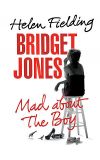
09 Oct 2013 05:15:55
It's always a jolt to remember that the first two Bridget Jones books, published way back in the 90s, predated texting, tweeting, Facebook and internet dating: the constant stream of personal updates pinging between our devices in 2013. Her diary-style abbreviations, number-crunching obsessiveness over trivia and jokey combination of self-exposure and self-deprecation have had such an influence on the tone of social media that we all sound like Bridget now.
So it's no surprise that Helen Fielding was tempted to let Bridget loose on what looks like her natural terrain. Think what opportunities modern technology offers for embarrassment: the erroneously forwarded email, the ill-advised drunken text, the disastrous internet date. What's surprising, and cheering, is that rather than freeze-framing her as the eternal thirtysomething, Fielding has allowed Bridget to age in real time, making her 51 (and in need of glasses to operate her smartphone).
More shockingly, instead of the dissatisfied divorcee one might have expected, Bridget is now a tragic widow. Mark Darcy has died a typically noble death, leaving her with two small children, Billy and Mabel. These days, as well as counting calories and alcohol units, she's also totting up nits on the comb and bags of grated cheese scoffed from the fridge while making the kids' supper.
Having had children late, and been bereaved, she's once again out of step with her friends, just as she was with the "smug marrieds" of her 30s. Now Jude is on the internet dating not-so-merry go round, Tom is obsessed with boutique hotel bargains on Laterooms.com, and glamorous Talitha is refusing to countenance that 60 might be middle-aged. Time has turned Daniel Cleaver from bad boy into sad case, unable to talk to a woman without inquiring after the colour of her "panties" and only good for a spot of inept babysitting.
And Bridget, after five years' mourning, is looking to get back into the dating game. But will the old rules still apply? "Everything has changed since you were single," says Talitha. "There was no texting. There were no emails. People spoke on telephones. Plus, young women are more sexually aggressive now, and men are naturally more lazy. You have to, at the very least, … encourage."
After launching herself on Twitter as @JoneseyBJ ("Cannot figure out how to put up photo. Is just empty egg-shaped graphic. Is fine! Can be photo of self before was conceived") and waiting for the followers to flood in, she hooks a "toyboy", 29-year-old Roxster, whose "ripped" body makes her the envy of her drooping middle-aged friends. Cue many comic tweets and texts, and a surprising number of fart and vomit jokes. There's the familiar agonising, with why-hasn't-he-called replaced by why-hasn't-he-texted, but mostly Roxster is funny, sexy and adoring enough to fulfil any woman's wishes.
Which is part of the problem: Bridget has been given such a tragic backstory, and the very grown-up burden of young fatherless children, that there's less traction to be had from dating niggles; and with so much darkness there already, Fielding seems unwilling to write any more in. There's a new sentimentality, even slushiness, to her old subjects of love, sex and loneliness; the familiar jaunty tone is reserved for playground politics and the chaos and cuteness of bringing up children.
But while the anxiety of the urban singleton was a fresh subject for comedy in the 90s, we've been reading this sort of thing for years, in countless slummy-mummy columns and books by Allison Pearson or Gill Hornby (all influenced, of course, by Fielding herself). There's a beautifully judged scene where Bridget is pierced with ridiculous overwhelming love for her children, even as they poo and puke in the grip of illness, but mostly the crushed rice cakes, lost car keys and melon balls for the sports day picnic have been done to death.
Also, where Bridget in her 30s was an everywoman figure, here she's a very yummy mummy indeed. Darcy has left her financially secure, with no need to work on anything but her improbable screenplay, an updating of Hedda Gabler set in Queen's Park. It's up to Roxster, part of the impoverished younger generation, to introduce her to the delights of the night bus. It's odd how posh contemporary comic writing about motherhood tends to be, and Mad About the Boy is no exception. As Bridget floats fragrantly around her son's school concert at a stately home, or wells up at the choir service, all the while having heart-thumping encounters with a masterful teacher, the book starts to seem less like a satire on modern life and more like a good old Jilly Cooper.

